Marco Rubio returns to his roots in Nevada
- Published
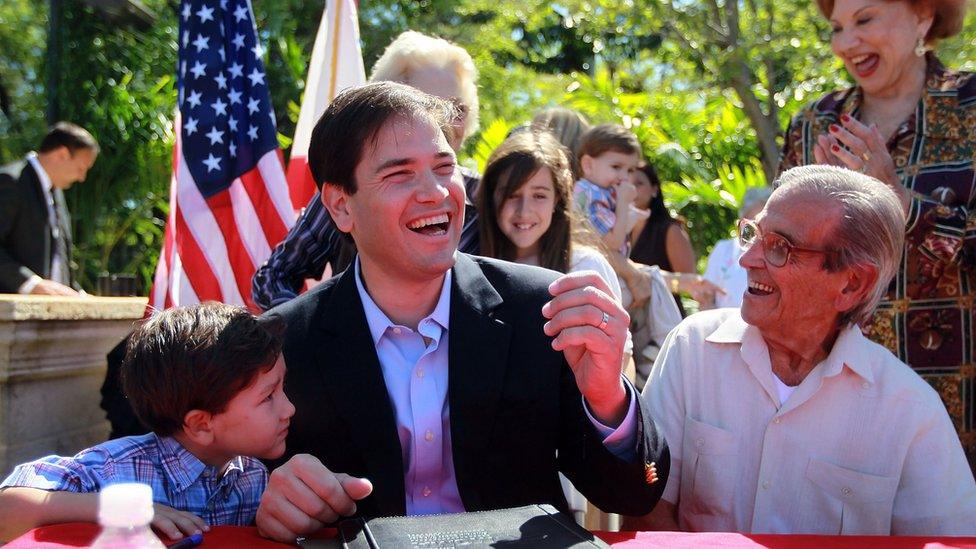
Marco Rubio is pictured with his father Mario (right) in 2010
Sam's Town Casino is just a handful of miles from the famed Las Vegas strip, but it feels like the other side of the world.
The glitz and glamour of the big Sin City hotels stand in marked contrast to the dingy, frontier-themed collection of buildings and parking structures, surrounded by strip malls and low-rent homes.
Across the street, oversized recreational vehicles pack a large open lot. Inside, the casino smells of stale cigarettes. An older clientele, many with canes and walkers, shuffle between the slots, gaming tables and $19.95 all-you-can-eat, steak-and-seafood buffet.
"I'll have a Miller Lite and a tall glass of ice," an elderly woman tells her bartender after grousing that they won't give her a free club soda unless she has a drink coupon, which are handed out to regular gamblers.
Once an hour some guests gather around an artificial waterfall to watch a small fountain and laser-light show that concludes with a patriotic montage set to Lee Greenwood's treacly ballad, God Bless the USA.
For Republican presidential candidate Marco Rubio, however, this run-down casino is an essential part of his American Dream story. It's where his father, Mario Rubio, found a job in 1979. He had just been laid off from his apartment manager position in Florida.
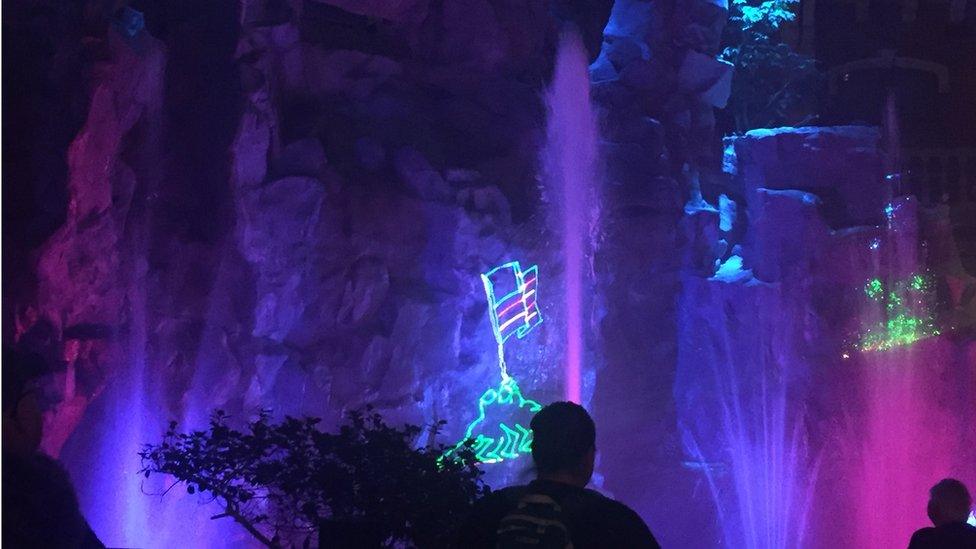
A patriotic light show is one of the attractions at Sam's Town Casino in Las Vegas
Although he had experience as a lead banquet bartender in Miami, the South Beach hotel business was struggling.
So Mario left his family, including Marco, behind to seek work in the Nevada desert, where his wife, Oriales, had sisters who said economic prospects were better
Mario Rubio started off as a bartender's aide, but he was quickly promoted to a full bartender assigned to the casino's basement bowling alley. After six months of saving, the rest of the Rubio family moved to Nevada to join Mario.
It's a bit of trivia that the bar's current steward, Cuban immigrant Ruben Monteagudo, finds amusing.
"His father worked here?" asks Monteagudo, an employee at Sam's for the past 10 years.
Although he had never heard of Mario Rubio, he did know of Marco - and the potentially historic nature of the 2016 presidential campaign, with two children of Cuban immigrants, Rubio and Ted Cruz, seeking the Republican nomination.
"I don't know much about the history of the United States, but it would be good for the Cubans here," he said. "I would like for Rubio to be president."
Monteagudo, who arrived in the US 22 years ago, said he loves his new home - but he has a word of warning for his fellow immigrants.
"Some people, when they come here, think it's going to be so easy," he said. "But you've got to work really hard. This country gives a lot of opportunity to immigrant people, but only if you work."
On the trail with Marco Rubio
A few hours later and a few miles away, at another, slightly newer casino on the outskirts of Las Vegas, Marco Rubio was painting a picture remarkably similar to Monteagudo's.
He makes his family's immigrant story a key part of his stump speech - adding that he knows the challenges Americans face and what it's like to have "ups and downs".
On Sunday night in Las Vegas, two days before Nevada's Republican presidential caucuses, he spoke once again of his childhood - and offered an extended recollection of the six years his family spent in Las Vegas.
"I'll never forget we landed here, I had never seen mountains before," he said. "They looked like cardboard cut-outs. My skin had never been so dry. But it was the place that allowed us to find the American Dream all over again."
"Las Vegas and Southern Nevada and the state, for us, will always be a place of new beginnings, and second chances and a new start."
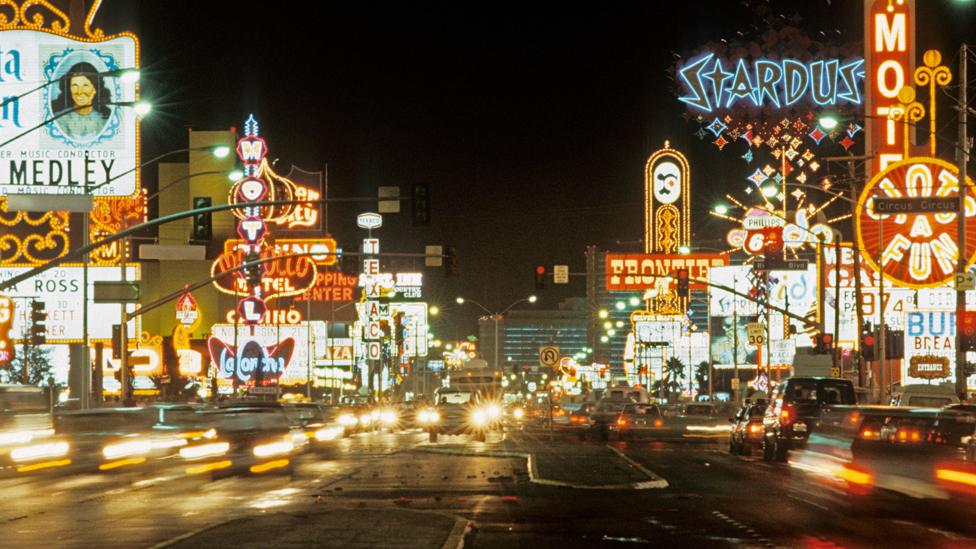
The Rubio family moved to Las Vegas in 1979 in search of better opportunities
The crowd in the packed ballroom cheered.
Rubio then pivoted to a message he hopes will resonate with voters in Nevada and across the US, as he fights a pitched battle against Donald Trump and Ted Cruz for the Republican nomination.
"It was here in Las Vegas that my parents taught me that it didn't matter that he was a bartender in Sam's Town and she was a maid at the Imperial Palace," he said. "I could be anything I was willing to work hard to become.
"That's not just my story, that's our story," Mr Rubio continued. "That's the story of our country, and that's the story of our people.
"I've never met most of you, and yet I'm confident in saying that your father gave up everything so you could have the chance to be all the things he never could," he said. "I'm confident in saying that your mother gave up her own dreams and hopes so you could one day have an opportunity she never had. Or maybe that's what your grandparents did for your parents. Or maybe that's what you're doing right now.
"Maybe you're the bartender at Sam's Town or the maid."
Broad appeal
According to University of Nevada political science professor Eric Herzik, Mr Rubio's immigrant pitch has less to do with appealing to Nevada's minority voters, who overwhelmingly vote Democratic, than convincing the state's white voters that he can have broad appeal in the general election.
If he's counting on minority voters, he says, "he hasn't done a very good job looking at the Nevada electorate".
"The strategy is he's the candidate who can bring the party together and defeat Hillary Clinton," he says.
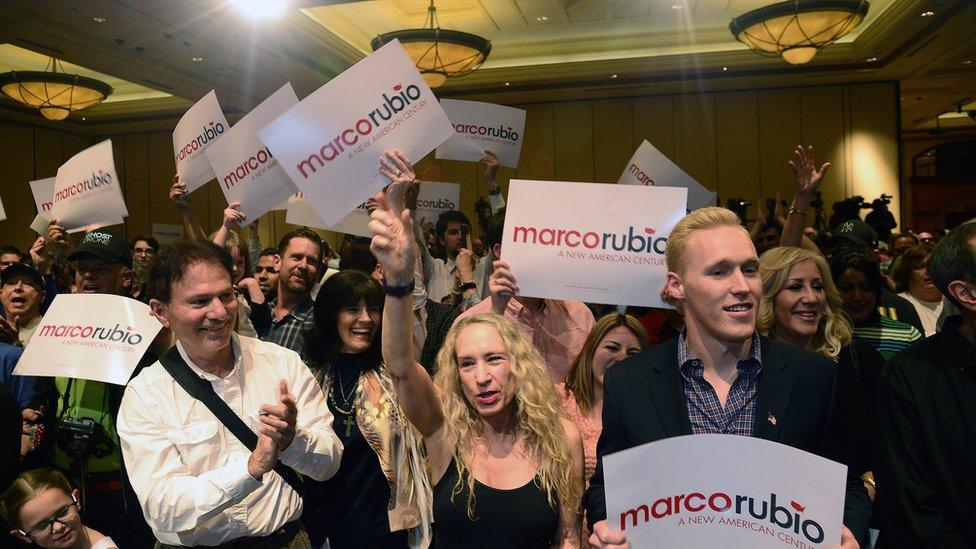
Many say that Rubio has the most mainstream appeal among the Republican candidates
For the thousands who attended Mr Rubio's Sunday night rally, at least, it was a message that resonates.
"He appeals across the board to so many people," said Jennifer Barrier of Las Vegas. "I feel like he really is a genuine person and he really wants to make a difference."
Another Las Vegas resident, Glen Potter, said Mr Rubio represents the "future of America".
"He's a young man, he's smart, he has good policies," he said. "He just makes sense."
Family ties
Tucked away near the front of the stage during Mr Rubio's speech on Sunday night was a small cordoned-off area for Mr Rubio's extended family, including an aunt and a handful of Mr Rubio's many cousins (his mother was one of seven sisters who came from Cuba in the mid-1950s, all of whom ended up settling in either Miami or Las Vegas).
"We lived right by each other," Michelle Denis said of Marco, whom she and the family refer to as "Tony", short for his middle name Antonio. "His parents had to work, so my mom would babysit. We'd hang out on weekends. They had a pool we'd swim in. We'd go on family trips together."
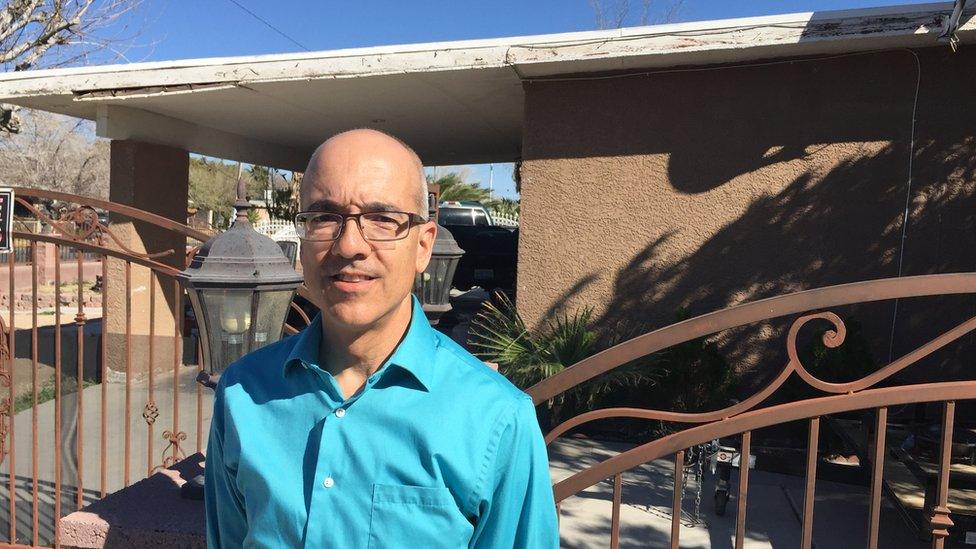
Moises Denis stands outside his cousin Marco Rubio's childhood home in Las Vegas
Not every cousin is on the Rubio bandwagon, however. Michelle's older brother, Moises Denis, didn't attend the Sunday night rally and, as a Democratic politician representing Las Vegas in the Nevada Senate, is on the opposite side of the political divide from his relative.
"We obviously were both raised the same way, and yet he's turned out a Republican, and I'm a Democrat," he said. "But our parents came here for the same reasons - they were pursuing that American dream and something better for our families."
Mr Denis still lives in the same neighbourhood where he and Marco Rubio grew up. His house is just a few blocks away from Rubio's childhood home, an unassuming one-storey structure. He says the area hasn't changed much from the early 1980s. It's largely made up of the elderly, immigrants and working-class families.
"There's a lot of hotel workers, a lot of construction workers," he says - the types of people whose behind-the-scenes labour keeps the glitzy casinos off in the distance running smoothly. "They're hardworking folks who have two or three jobs. They come from humble circumstances."
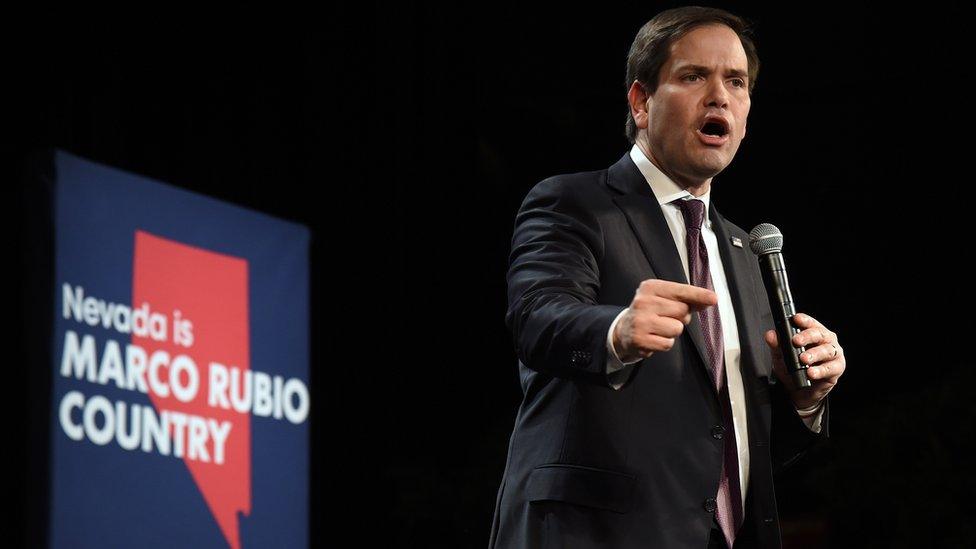
He says he's following the Rubio campaign closely and that Mr Trump's recent success, fuelled by anti-immigration rhetoric, is "a bit scary". He says he thinks national Republican politics, and the Trump phenomenon, is pushing all the campaigns, including his cousin's, to the right.
In the end, however, it's Mr Rubio's upbringing, which Mr Denis witnessed firsthand, that gives him hope.
"He knows what it's like to try to make ends meet, to try to provide for your families," Mr Denis says. "He definitely has a different perspective from some of the folks who may have had a more privileged life."
Trump country
Nevada Professor Herzik says the Rubio campaign has spent more time and money in Nevada than any other candidate. And while Mr Cruz is pitching to the state's rural conservatives and Mr Trump is counting on angry, disaffected voters, the Florida senator is trying to win the party's mainstream support. He's nabbed endorsements from the state's popular lieutenant governor, Mark Hutchison, and its Republican senator, Dean Heller.
While Mr Rubio's campaign can survive a defeat in Nevada - and Mr Trump has solid leads in all the recent polls - a strong performance here would help convince Republicans that he's capable of fending off Mr Cruz and eventually toppling Mr Trump.
That may end up being a tall order, however, and it's Sam's Town Casino that once again offers a cautionary tale for team Rubio.
While bowling alley bartender Monteagudo may be a fan of his fellow Cuban-American, upstairs in the casino the view is decidedly different.
"Someone told me I had to vote for Rubio because his dad worked here," said Roy, who works the back bar. "Not on your life."
He said he's supporting Donald Trump, as one of the patrons looks up from his video poker game and nods in approval.
Across the casino floor, Richard, another long-time bartender, says he's also a Trump supporter.
"All politicians are crooks," he said. "But Trump's got the right idea."
Nevada is Marco Rubio's childhood home, the place he says gave his family a second chance at the American dream. Now he hopes it will give his campaign an opportunity for its first victory of the Republican campaign season.
On Tuesday, however, it may end up being Trump country.